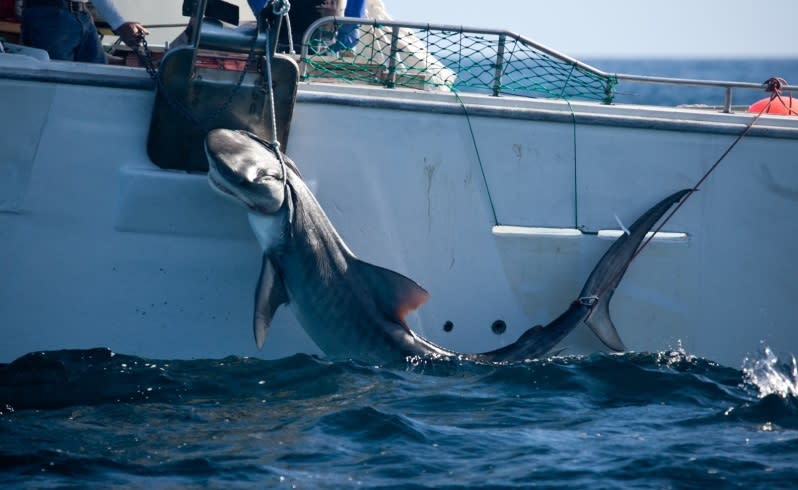Shark kill injunction denied

UPDATE: An urgent bid to stop the Government's shark kill policy has failed, with the Supreme Court ruling the exemptions allowing the baiting are valid and the drum lines can continue.
Justice James Edelman today dismissed calls for an injunction that was sought by marine activist Sea Shepherd and shark victim Kyle Burdon's mother, Sharon Burden, who argued there should be an injunction halting the baits and a judicial review into whether exemptions allowing the Government to kill the protected species were legally valid.
This afternoon, the judge found that the exemptions did not need to be published in the Government Gazette and that a failure to do so did not mean the policy was unlawful.
Lawyers for the State had already flagged that even if the court ruled the exemptions should have been published in the Gazette, the Government would immediately move to do so to prevent interference with its "public safety" program.
It is understood that the applicants believed the exemption should be published in the Gazette because it could then be scrutinised by parliament and possibly a motion to disallow the exemption.
Sea Shepherd and Ms Burden took their bid to overturn the policy to the WA courts a week ago, after a spate of protests across the country and coverage in international media.
Their court battle has been argued by the not-for-profit Environmental Defender's Office.
The State argued during the court hearing that the policy was part of an important public safety program, with the measure introduced after a string of shark attacks in WA that claimed seven lives over the past three years.
Because of the special exemptions under fisheries management laws, the Government had been able to set baited hooks off metropolitan and South West beaches, with bull, tiger and great white sharks measuring more than 3m long being shot and dumped at sea.
Despite today's ruling, drum lines are expected to be pulled out of the water at the end of April after Federal Environment Minister Greg Hunt confirmed on Tuesday that an extension to a federal exemption allowing the kill would be needed for it to continue.
Premier Colin Barnett wrote to Mr Hunt on February 17 advising WA’s shark cull would be implemented on an “ongoing basis”.
But this week Mr Hunt confirmed in writing that the killing of protected species of sharks could only proceed while the federal exemption was in place and an extension of the kill would need to pass through a full assessment of the Environmental Protection and Biodiversity Conservation Act, which could take as long as 12 to 18 months.
Mr Hunt had said he had told his department to work closely with the WA Government to ensure any assessment took place in a timely manner.
Mr Barnett has previously said he anticipated a legal challenge and maintained the State and Federal governments followed the proper processes.
The court today ordered that a judicial review was no longer needed on the issue.
The court was told that the applicants could have to pay $19,000 in costs to the State over their failed court bid.
Justice Edelman noted in his decision today that the injunction case centred on a “purely legal question”, but one that was “not without considerable difficulty at the margins”.
Key to each side’s arguments about whether the exemptions allowing the cull should have been gazetted was the notion of whether they were “legislative” or “administrative” exemptions.
During the hearing, lawyers for Sea Shepherd and Ms Burden argued every exemption other than purely procedural ones were “legislative” in effect and should be gazetted.
But lawyers for the State argued that instruments that gave effect to exemptions under WA’s Fish Resources Management Act never had a legislative effect.
In his decision, Justice Edelman said the line between a “legislative” and “administrative” effect was blurred and difficult to draw, but in his view the exemptions did not have a legislative effect.
He went on to say that even if they had fallen into that category, it appeared they did not need to be gazetted.
During earlier legal arguments, the judge noted that the case could have broader implications for other licences and permits under the fisheries management legislation.
In his decision this afternoon, Justice Edelman said that if Sea Shepherd and Ms Burden had been right then every licence permit would have to be gazetted.
Mr Barnett today welcomed the Supreme Court decision, saying it vindicated the Government's handling of the policy and its right to do things in the interests of public safety.
"We felt we had followed a rigorous, legitimate process in deploying drum lines at popular beaches in the South West and metropolitan area," Mr Barnett said this afternoon.
"This policy has been driven by concerns for public safety, given the increased number of fatal shark attacks in Western Australian waters in the last three years.
"The drum lines will stay in place until April 30, as we work with the Federal Government to extend the program into next summer."
Greens MLC Lynn MacLaren described Justice Edelman's decision as "disappointing" but joined Sea Shepherd managing director Jeff Hansen in vowing that moves to dismantle the Government's policy would go ahead and ultimately be successful.
She suggested “all eyes” were now on the Environmental Protection Authority, which will decide within weeks whether to assess the policy. An assessment would halt the baiting while the EPA scrutinised the program and considered its recommendation.
Ms Burden also expressed her disappointment with the result, saying she was disturbed that the Government seemed able to simply exempt itself from laws without scrutiny.
She said she had brought up her son, who died after a shark attack in 2011, to stand up for his principles and beliefs and that the same approach had compelled her to take legal action against the cull policy.

